
November 12
1802 Birth: Gustav Friedrich Klemm:
German anthropologist who developed the concept of three stages of cultural evolution and is thought to have influenced the prominent English anthropologist Sir Edward Burnett Tylor. Klemm spent most of his life as director of the royal library at Dresden (from 1831). He distinguishing three stages of cultural evolution (which he identified as those of savagery, domestication, and freedom). Klemm divided mankind into active and inactive races and believed that peoples differed in mentality and temperament. He wrote about this 10 volume work, Allgemeine Kulturgeschichte der Menschheit.
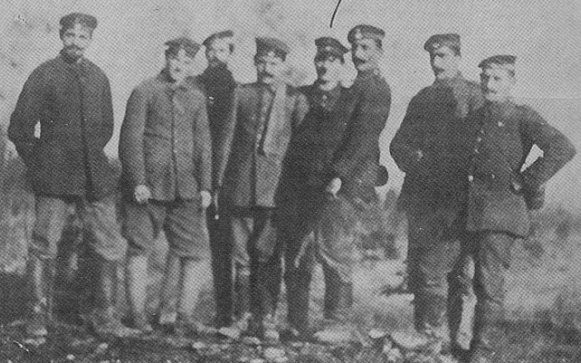
Hitler and his fellow dispatch runners
1914 List Regiment (Nov 10-15): Gefreiter Adolf Hitler serves as a regimental orderly (Ordonnanz) and one of eight dispatch runners (Meldegaenger) in a line of trenches before Messines. [For further details, Click here.]
1915 World War I (Oct 4, 1915 - Feb 29, 1916): Gefreiter Adolf Hitler's serves with 16 Reserve Infantry Regiment at Fromelles. [For further details, Click here.]
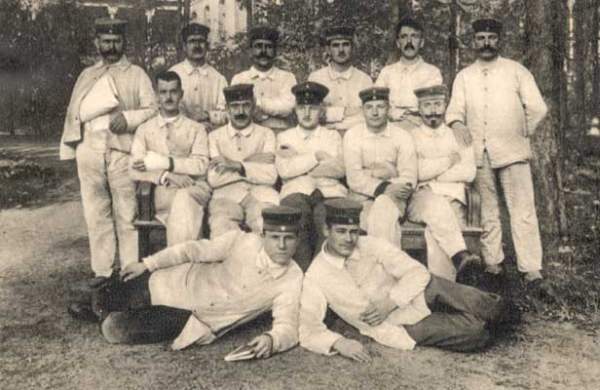
1917 World War I: Italy: The arrival of British and French reinforcements in Italy enables Cadorna to stabilize the Italian front at the Piave River. Italy suffers over 40,000 casualties, as well as 275,000 prisoners.
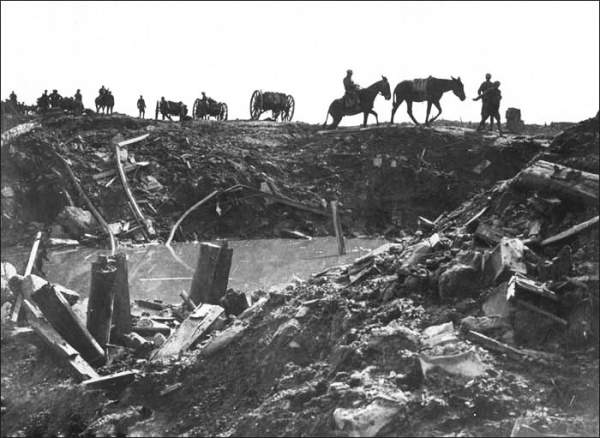
1918 World War I: Various:
Allied fleet enters Dardanelles:
On November 12, 1918, one day after an armistice ended World War I, the Allied fleet passes through the Dardanelles, the narrow strait running between Europe and Asia that had in 1915 been the site of a disastrous Allied naval operation.
As the only waterway between the Black Sea in the east and the Mediterranean Sea in the west, the Dardanelles was a much-contested area from the beginning of the First World War. The naval attack, spearheaded by Winston Churchill, Britain's young first lord of the Admiralty, opened on March 18, 1915, when six English and four French battleships headed toward the strait. Turkish mines blasted five of the ships, sinking three of them and forcing the Allied navy to draw back until land troops could be coordinated to begin an invasion of the Gallipoli peninsula. With troops from the Ottoman Empire and Germany mounting a spirited defense of the peninsula, however, the Gallipoli offensive turned into a significant setback for the Allies, with 205,000 casualties among British Empire troops and nearly 50,000 among the French.
Allied troops had more success, though, with their later offensives in Mesopotamia and Palestine. By September 1917, the crucial cities of Jerusalem and Baghdad were both in British hands. As the war stretched into the following year, these defeats and an Arab revolt had combined to destroy the Ottoman economy and devastate its land, leaving some 6 million people dead and millions more starving. In early October 1918, unable to bank on a German victory any longer, the Turkish government in Constantinople sought to cut its losses and approached the Allies about brokering a peace deal. On October 30, British and Turkish representatives signed the Treaty of Mudros, ending Ottoman participation in World War I. By the terms of the treaty, Turkey had to demobilize its army, release all prisoners of war, and evacuate its Arab provinces—the majority of which were already under Allied control—and open the Dardanelles and Bosporus to Allied warships.
This last condition was fulfilled on November 12, the day after the general armistice, when a squadron of British warships steamed through the Dardanelles, past the ruins of the ancient city of Troy, toward Constantinople. By the post-war terms worked out by the Allies and formalized in the Treaty of Sevres in 1920, the waterways formerly under Ottoman rule—including the Dardanelles, the Sea of Marmora and the Bosporus—were placed under international control, with the designation that their "navigation . . . shall in future be open, both in peace and war, to every vessel of commerce or of war and to military and commercial aircraft, without distinction of flag." (History.com)
Austria becomes a republic: Emperor Karl of Austria-Hungary flees to Switzerland one day after abdicating.
Encouraged by Hungarian nationalists, he sought twice in 1921 to reclaim the throne of Hungary but failed due to various factors including the lack of support of the Hungarian Regent Miklós Horthy. Horthy's failure to support Charles' restoration attempts is often described as "treasonous" by monarchists. Critics suggest that Horthy's actions were more firmly grounded in political reality than the King of Hungary.
1921 A Limitation of Armaments conference takes place in Washington, DC:
More formally known as the International Conference on Naval Limitation, this disarmament effort was occasioned by the hugely expensive naval construction rivalry that existed among Britain, Japan, and the United States. Senator William E. Borah, Republican of Idaho, took the lead on this matter and urged that the major Allied nations from the recent war gather in an effort to slow the arms race. The proposal was not met with initial enthusiasm by the Harding administration, but it became a political imperative when it was portrayed as a Republican alternative to League of Nations. [For further details, Click here.]
1927 Trotsky is expelled from the Soviet CP as Stalin becomes the undisputed dictator:
In October 1927, Trotsky and Zinoviev were expelled from the Central Committee. When the United Opposition tried to organize independent demonstrations commemorating the 10th anniversary of the Bolshevik seizure of power in November 1927, the demonstrators were dispersed by force and Trotsky and Zinoviev were expelled from the Communist Party on November 12. Their leading supporters, from Kamenev down, were expelled in December.
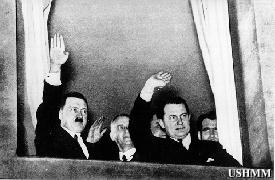
1933 Weimar: Hitler receives 92% of the vote in new German elections.
1936 The opening session of the Peel Commission begins in Palestine:
The commission, headed by Lord Robert Peel, heard a great deal of testimony in Palestine, and in July 1937 issued its recommendations: to abolish the Mandate and partition the country between the two peoples. Only a zone between Jaffa and Jerusalem would remain under the British mandate and international supervision. The Jewish state would include the coastal strip stretching from Mount Carmel to south of Be'er Tuvia, as well as the Jezreel Valley and the Galilee. The Arab state was to include the hill regions, Judea and Samaria, and the Negev. Until the establishment of the two states, the commission recommended, Jews should be prohibited from purchasing land in the area allocated to the Arab state.
1938 Holocaust: From a report of a meeting held under Hermann Goering's chairmanship:
Goering:Today's meeting is of a decisive nature. I have received a letter written by the chief of staff of the Fuehrer's Deputy, Bormann, on the Fuehrer's orders directing that the Jewish question be now, once and for all, coordinated and solved one way or another . . . .
Walter Funk: I have prepared a law for this case which provides that as from 1 January 1939 Jews shall be prohibited from operating retail stores and mail-order establishments as well as independent workshops. They shall be further prohibited from hiring employees for that purpose or offering any goods on the market. Wherever a Jewish shop is operated, it is to be closed by the police. From 1 January 1939 a Jew can no longer operate a business in the sense of the law for the regulation of national labor of 20 January 1934.
Fischbock, speaking for Arthur Seyss-Inquart: Your Excellency: In this matter we have already a very complete plan for Austria. There are 12,000 Jewish artisans and 5,000 Jewish retail shops in Vienna. Before the seizure of power we had already a definite plan for tradesmen, regarding this total of 17,000 stores. Of the shops of the 12,000 artisans about 10,000 were to be closed definitely and 2,000 were to be kept open; 4,000 of the 5,000 retail stores should be closed and 1,000 should be kept open, that is, Aryanized. According to this plan, between 3,000 and 3,500 of the total of 17,000 stores would be kept open, all others closed. This was decided following investigations in every single branch and according to local needs, in agreement with all competent authorities, and is ready for publication as soon as we receive the law which we requested in September. This law shall empower us to withdraw licenses from artisans quite independent of the Jewish question. I shall have this decree issued today...Out of 17,000 stores 12,000 or 14,000 would be closed and the remainder Aryanized or handed over to the Bureau of Trustees which is operated by the State.
Goering: I have to say that this proposal is grand. This way the whole affair would be wound up in Vienna, one of the Jewish capitals, so to speak, by Christmas or by the end of the year.
Funk: We can do the same thing over here.
Holocaust: German Jewry is ordered to pay "Atonement Payments" of one billion Reichmarks to the German government for the damages caused by German citizens during Kristallnacht, and insurance payments amounting to more than ten million Reichmarks are soon paid to the German government. (THP)
Jews are prohibited from attending theaters, movies, concerts, and exhibits. Jews are no longer allowed to own stores and artisan businesses. (THP)
Danzig: Nov 12-14 Nazis in Danzig burn down two synagogues and badly damage two others (THP):

Jews were increasingly persecuted; the Danzig Great Synagogue was taken over and demolished by the local authorities in 1939. Despite several years of proposals by the German governments, both before and after 1933, to renegotiate Danzig's anomalous position, Poland refused, and as late as April 1939 Professor Burckhardt was told by the Polish Commissioner-General that any attempt to alter its status would be answered with armed resistance on the part of Poland.
1939 Various:
World War II: King George VI of England and President Lebrun of France reply to Queen Wilhelmina and King Leopold, refusing to negotiate with Hitler.
Church and Reich: A Te Deum is sung in the Cathedral of Munich "in order to thank the Divine Providence in the name of the archdiocese for the Fuehrer's fortunate escape from the criminal attempt made upon his life." (THP)
1940 World War II: Various:
Molotov arrives for meetings in Berlin to discuss mutual spheres of interest, especially regarding Finland. The talks show serious disagreements between the participants.
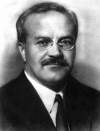
During Molotov's interview with Hitler, the Soviet Union was invited to join the Tripartite Pact and share in the spoils of the British Empire. The Fuehrer told the Commissar that Britain was all but defeated and it was time to consider what to do with her imperial territories. He hinted that Germany and Italy intended to advance southward and divide Africa between them and he suggested that the Soviets should do likewise — advance south — and take India. Molotov in turn emphasized the need to settle outstanding disputes over the future of Finland and the Balkans as well as a host of other issues before discussing the partition of the — as yet — undefeated British Empire. Molotov did not, however, dismiss the idea outright. Historical interest in this fateful meeting has never been very high. Essentially, it has always been assumed that Hitler's magnanimous offer was disingenuous and subsequent events certainly seem to suggest this to be the case. Even so, it is worth noting that there is no evidence that a final decision on attacking the Soviets had been made before the meeting. A draft plan for a German invasion of the USSR was presented to Hitler three weeks after his meeting with Molotov and Directive No. 21 Operation Barbarossa was issued two weeks after that. There is every reason to believe that Hitler did not make up his mind about attacking the Soviet Union before meeting with Molotov.

Joseph Goebbels writes in his diary: "Long talks on vegetarianism and the coming religion with Hitler. The fuehrer is totally consistent in this question and has all the arguments at his disposal." (THP)
Churchill honors the late Neville Chamberlain:
It fell to Neville Chamberlain in one of the supreme crises of the world to be contradicted by events, to be disappointed in his hopes, and to be deceived and cheated by a wicked man. But what were these hopes in which he was disappointed? What were these wishes in which he was frustrated? What was that faith that was abused? They were surely among the most noble and benevolent instincts of the human heart-the love of peace, the toil for peace, the strife for peace, the pursuit of peace, even at great peril, and certainly to the utter disdain of popularity or clamour. Whatever else history may or may not say about these terrible, tremendous years, we can be sure that Neville Chamberlain acted with perfect sincerity according to his lights and strove to the utmost of his capacity and authority, which were powerful, to save the world from the awful, devastating struggle in which we are now engaged. This alone will stand him in good stead as far as what is called the verdict of history is concerned.
1941: The FBI arrest 15 Japanese American businessmen and community leaders in Los Angeles' Little Tokyo. All those arrested cooperate fully, and a spokesman for the Central Japanese Association proclaims: "We teach the fundamental principles of America and the high ideals of American democracy. We want to live here in peace and harmony. Our people are 100% loyal to America." (Niiya)
[See: Countdown to Infamy: Timeline to Pearl Harbor.]1942 World War II: Various:
The naval battle of Guadalcanal continues between Japanese and American forces:
Army battalions assisted in a major victory during 9-12 November when they trapped against the sea 1,500 enemy troops who had just landed at Koli Point. Soldiers and marines killed half the enemy force in a two day fight; the rest escaped into the jungle toward Mount Austen, six miles southwest of Henderson Field. Vandegrift suddenly stopped his attacks in mid-November when he learned the Japanese would soon attempt a major reinforcement via the "Tokyo Express," the almost nightly run of supply-laden destroyers to the island. As expected, the enemy transports came.

North Africa: The British Eighth Army under General Bernard Montgomery retakes Sollum, Bardia, and Tobruk (Libya), taking at least 30,000 prisoners, while Panzerarmee Afrika continues its withdrawal toward Tripoli.
1944 World War II: Various:
War against Japan: US fighters wipe out a Japanese convoy near Leyte, consisting of six destroyers, four transports, and 8,000 troops.
Brits sink the battleship Tirpitz:
On this day in 1944, 32 British Lancaster bombers attack and sink the mighty German battleship Tirpitz.
In January 1942, Hitler ordered the Germany navy to base the Tirpitz in Norway, in order to attack Soviet convoys transporting supplies from Iceland to the USSR. The Tirpitz also prevented British naval forces from making their way to the Pacific. Winston Churchill summed up the situation this way: "The destruction or even crippling of this ship is the greatest event at the present time... The whole strategy of the war turns at this period on this ship..."
Attacks had already been made against the Tirpitz. RAF raids were made against it in January 1942, but they failed to damage it. Another raid was made in March; dozens of RAF bombers sought out the Tirpitz, which was now reinforced with cruisers, pocket battleships, and destroyers. All of the British bombers, once again, missed their target.
Sporadic attacks continued to be made against the German battleship, including an attempt in October 1942 to literally drive a two-man craft up to the ship and plant explosives on the Tirpitz's hull. This too failed because of brutal water conditions and an alert German defense. But in September 1943, six midget British subs set out to take the Tirpitz down for good. The midgets had to be towed to Norway by conventional subs. Only three of the six midgets made it to their target. This time, they were successful in attaching explosives to the Tirpitz's keel and doing enough damage to put it out of action for six months. Two British commanders and four crewmen were taken captive by the Germans and spent the rest of the war as POWs.
But it wasn't until November 1944 that the Tirpitz was undone permanently. As the battleship lay at anchor in Norway's Tromso Fjord, 32 British Lancaster bombers, taking off from Scotland, attacked. Each bomber dropped a 12,000-pound Tallboy bomb and two hit their target, causing the Tirpitz to capsize, and killing almost 1,000 crewmen.
Ironically, the mighty Tirpitz fired its guns only once in aggression during the entire extent of the war: against a British coaling station on the island of Spitsbergen. (History.com)
1948 Japanese war criminals sentenced:
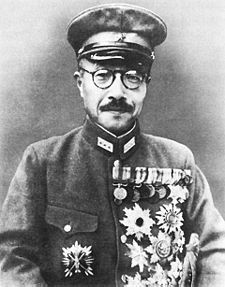
An international war crimes tribunal in Tokyo passes death sentences on seven Japanese military and government officials, including General Hideki Tojo, who served as premier of Japan from 1941 to 1944.
Eight days before, the trial ended after 30 months with all 25 Japanese defendants being found guilty of breaching the laws and customs of war. In addition to the death sentences imposed on Tojo and others principals, such as Iwane Matsui, who organized the Rape of Nanking, and Heitaro Kimura, who brutalized Allied prisoners of war, 16 others were sentenced to life imprisonment. The remaining two of the 25 defendants were sentenced to lesser terms in prison.
Unlike the Nuremberg trial of German war criminals, where there were four chief prosecutors representing Great Britain, France, the United States, and the USSR, the Tokyo trial featured only one chief prosecutor—American Joseph B. Keenan, a former assistant to the U.S. attorney general. However, other nations, especially China, contributed to the proceedings, and Australian judge William Flood Webb presided. In addition to the central Tokyo trial, various tribunals sitting outside Japan judged some 5,000 Japanese guilty of war crimes, of whom more than 900 were executed. (History.com)
1949 Death: Walter Buch: believed to have committed suicide by slashing his wrists and drowning himself in Ammer Lake. Buch had been Chairman of the Supreme Party Court of the NSDAP and father-in-law of Martin Bormann. Was sentenced to five years in a labor camp after the war.
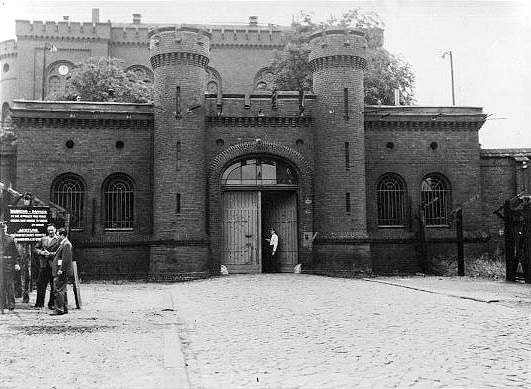
1964 Spandau Prison: From Spandau: The Secret Diaries, by Albert Speer:
During the noon recess today I was having a lively, hour-long chat with Gobeaux when Schirach suddenly made his signal flap drop. Indignantly, he demanded quiet; he wanted to sleep, he said. His lordly tones offended the Frenchman, who told Schirach that it was not the prisoners business to decide when and how the guards should converse. Schirach self-righteously referred Gobeaux to the prison rule forbidding guards to speak with prisoners. "Very well, then shut your trap now!" Gobeaux replied; he added that singing and whistling were also, incidentally, against the rules. But Schirach refused to be intimidated. "If you don't stop talking to Number Five right this minute, I'll report you to the Russian director," he threatened. We would not let him bully us, but all the fun had gone out of our chat. Soon we ended it.
1982 USSR: Yuri Andropov assumes power:
Following the death of long-time Soviet leader Leonid Brezhnev two days earlier, Yuri Andropov is selected as the new general secretary of the Communist Party in the Soviet Union. It was the culmination of a long, but steady march up the Communist Party hierarchy for Andropov.Born in Russia in 1914, by the 1930s Andropov was an active participant in the Communist Youth League. During World War II, he led a group of guerilla fighters who operated behind Nazi lines. His work led to various positions in Moscow, and in 1954, he was named as Soviet ambassador to Hungary. During the Hungarian crisis of 1956, Andropov proved his reliability. He lied to Hungarian Prime Minister Imre Nagy about Soviet military intentions, and later assured Nagy that he was safe from Soviet reprisals. Soviet tanks rolled into Budapest in November 1956 and Nagy was captured and executed in 1958.Andropov’s work in Hungary brought him back to Moscow, where he continued to rise through the ranks of the Communist Party. In 1967, he was named head of the KGB, Russia’s secret police force. A hard-liner, he supported the 1968 invasion of Czechoslovakia and oversaw the crackdown on dissidents such as Andrei Sakharov and Aleksandr Solzhenitzyn. In 1982, with Brezhnev deathly ill and fading fast, Andropov left the KGB and began jockeying for power. When Brezhnev died on November 10, 1982, Andropov was poised to assume power. He was named general secretary on November 12.His rule was short-lived, but eventful. . . . Andropov had suffered from nearly debilitating illnesses since early 1983, and died on February 9, 1984. He was succeeded by Konstantin Chernenko. [For further information, click here.]
1990 Akihito enthroned as emperor of Japan:
Crown Prince Akihito, the 125th Japanese monarch along an imperial line dating back to 660 B.C., is enthroned as emperor of Japan two years after the death of his father.
Akihito, the only son of the late Emperor Hirohito, was the first Japanese monarch to reign solely as an official figurehead. His father, Hirohito, began his reign in 1926 as theoretically absolute, though his powers were sharply limited in practice. After the Japanese defeat in World War II, Hirohito was formally stripped of his powers by the United States and forced to renounce his supposed divinity. With the signing by Japan of the amended constitution of 1946, the emperor became the official figurehead of Japan.
Akihito caused controversy in 1959, when as heir to the Japanese throne he broke a 1,500-year-old tradition and married a commoner, Shoda Michiko, the daughter of a wealthy businessman. Upon becoming emperor, Akihito, an amateur marine biologist and accomplished cellist, commenced a new Japanese era, known as Heisei, or "Achieving Peace." The imperial couple have three children: Crown Prince Naruhito, born in 1960; Prince Akishino, born in 1965; and Princess Nori, born in 1969. (History.com)
Edited by Levi Bookin (Copy editor)
levi.bookin@gmail.com



Click to join 3rdReichStudies



Disclaimer: This site includes diverse and controversial materials--such as excerpts from the writings of racists and anti-Semites--so that its readers can learn the nature and extent of hate and anti-Semitic discourse. It is our sincere belief that only the informed citizen can prevail over the ignorance of Racialist "thought." Far from approving these writings, this site condemns racism in all of its forms and manifestations.
Fair Use Notice: This site may contain copyrighted material the use of which has not always been specifically authorized by the copyright owner. We are making such material available in our efforts to advance understanding of historical, political, human rights, economic, democracy, scientific, environmental, and social justice issues, etc. We believe this constitutes a "fair use" of any such copyrighted material as provided for in section 107 of the US Copyright Law. In accordance with Title 17 U.S.C. Section 107, the material on this site is distributed without profit to those who have expressed a prior interest in receiving the included information for research and educational purposes. If you wish to use copyrighted material from this site for purposes of your own that go beyond 'fair use', you must obtain permission from the copyright owner.
Please Note: The list-owner and the moderator of 3rdReichStudies are not responsible for, and do not necessarily approve of, the random ads placed on our pages by our web server. They are the unfortunate price one pays for a 'free' website.